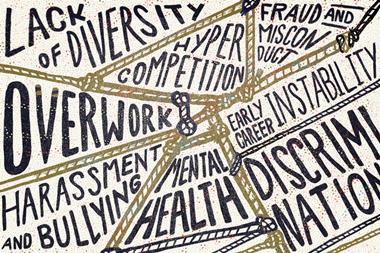Not enough has been done to support students during the pandemic

I think we can all agree that the last 18 months have been extremely tough. The lockdown effects of this pandemic have been particularly challenging on everyone’s mental health, likely in ways that many of us don’t even realise. This is my experience.
After taking a two-year break from education, I returned to the world of science in September 2020 to study a master’s degree by research in chemistry. The programme involved working full-time alongside PhD students in a research lab while simultaneously attending lectures, studying and sitting exams.
Shortly before starting my degree, I felt my mental health was starting to suffer. As someone who has struggled with anxiety and depression, I knew that I needed to seek help. Therapy had previously guided me through a very difficult time, so I contacted the doctors in the hope of being proactive. Unfortunately, I was met by a seven-month waiting list. From my past experiences, I was aware that a long wait for NHS therapy was to be expected. So, although I felt disheartened, I wasn’t surprised.
Fast forward to December. I was settling into the lab while working hard for my upcoming exams. Covid restrictions forced all lectures to be virtual and time in the lab was reduced: our research group operated on a ‘bubble’ rota to restrict lab occupancy to 50%. Studying the course material from home and knowing no other students was extremely hard. I joined 4th year undergraduate lecture courses, which meant everybody else was already acquainted. The university provided no virtual events to allow me to meet my peers.
Successful teaching depends on collaboration and communication. I felt isolated and completely alone. I reached out to the university for help at this time and made it clear how much I was struggling, but I was met with little-to-no support. They seemed completely unequipped to deal with the situation.
Financial pressures were also affecting me. Student loans available for master’s courses must also cover course fees, leaving much less for living costs than an undergraduate student loan. I was working weekends in Subway to support myself but it was becoming too much to balance with the intensity of my course.
I couldn’t leave my bed for feeling so anxious and overwhelmed. I was told to stop procrastinating
Around this time, I received my first NHS therapy appointment. It was very different to what I expected. Everything was over the phone because of Covid restrictions. Each session was cut short by my therapist without explanation and then continued with ‘worksheets’ by email. If I didn’t have time to complete the worksheets (being in the midst of exams), I was lectured on how I needed to make more of an effort. The final straw was just after my exams finished. I couldn’t leave my bed for feeling so anxious and overwhelmed. I was told to stop procrastinating.
Through previous experiences, I knew the importance of making mental health a priority, so I spent my last savings on a private therapist. It’s one of the best decisions I’ve ever made. They even gave me a subsidised rate for being a student. I have been extremely lucky in that sense and they have helped me make the progress I need. However, many others who cannot afford to pay for private support will have to depend on the very limited services available.
Having spoken with other people, some have had a similar, negative experience with NHS therapy, but others have had a very positive experience. It appears to be a game of luck. With something as important as mental health support, you need a guarantee.
Conversations about mental health are improving but it is still not talked about enough. It’s hard to know how to ask for support or even identify when you need it, especially in a competitive environment such as academia. Although the members of my research group are lovely and I consider them to be friends, whenever I try to broach the topic of mental health, people feel awkward.
The structure of academia does not promote good habits for mental wellbeing. For example, taking holidays is viewed as losing time in the lab. The environment can make something that is essential for our mental health feel shameful. Better habits need to be encouraged by the principal investigators in charge of their research groups, as well as by the university itself. There needs to be more emphasis on promoting a balanced lifestyle, over achieving results.
It is essential that we start talking more openly about mental health and that better-quality support is made more accessible for everyone. Universities in particular should prioritise improving their services. They could, for example, offer a regular, reliable counselling service and do more to promote open conversations in order to raise awareness. People need to know where they can ask for help and that they are not alone.
Additional information
If you are in a similar position and require support please contact the RSC’s wellbeing and listening service for chemists: rsc.org/membership-and-community/chemists-community-fund/wellbeing-and-family/wellbeing-and-listening-service/












No comments yet